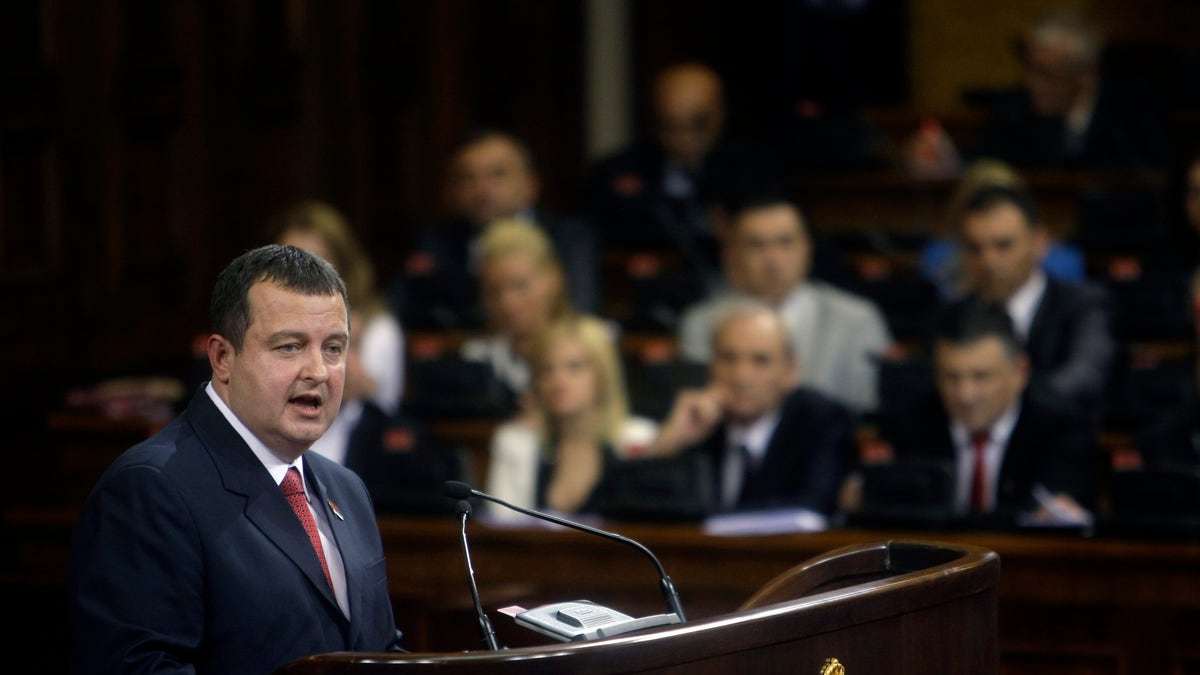
July 26, 2012- Serbia's prime minister designate, Ivica Dacic, speaks to members of the parliament in Belgrade, Serbia. (AP)
BELGRADE, Serbia – Slobodan Milosevic's former spokesman became Serbia's new prime minister on Friday, promising to promote reconciliation in the Balkans after his nomination triggered fears of resurgent nationalism in the volatile region.
The election marks the first time Milosevic's former party and their allies will dominate the government since they ruled Serbia for a decade in the 1990s -- an era marked with wars, international sanctions and economic downturn.
Milosevic was ousted from power in 2000 following a popular revolt. He was widely blamed for instigating the Balkan wars that followed the breakup of the former Yugoslavia. The wars claimed more than 100,000 lives and left millions homeless.
The Cabinet of Prime Minister Ivica Dacic was approved with 142 votes for and 72 against in a 250-member assembly, ending nearly three months of political uncertainty that followed an inconclusive election on May 6.
After the vote, Dacic said he was pleased with the wide backing he received in the parliament. He reiterated that Serbia's bid to join the European Union will be a "main task," saying that he has already spoken on the phone with EU's top foreign policy official, Catherine Ashton.
Dacic's coalition government includes ministers from his own Socialist Party, from a nationalist Progressive Party of President Tomislav Nikolic and from several smaller groups.
Besides Dacic, the new government includes other prominent figures from the Milosevic era.
Aleksandar Vucic -- who is in charge of defense and security in the new government -- was Milosevic's former information minister, notorious for his extremist views during the 1998-99 Kosovo war.
Former nationalists have sought to distance the country from the war era. But they have maintained strong ties with Russia and have suggested in the past that they could drop the EU bid if it meant they must give up Serbia's claim on Kosovo, a former province that declared independence in 2008.
During the parliamentary debate on Thursday, opposition lawmakers compared Dacic's government to those under Milosevic. Liberal leader Cedomir Jovanovic said: "Serbia is the only place in the world where someone destroys the country and can just change a tie and move on."
Similar concerns were voiced in Kosovo, the ethnic Albanian-dominated territory that declared independence in 2008 after the brutal war. Foreign Minister Enver Hoxhaj called Serbia's new government "antidemocratic and anti-European" and "rooted in the past."
Milosevic died in 2006 in custody of the U.N. court in The Hague, Netherlands, while being tried for genocide.
Dacic was Milosevic's wartime spokesman, nicknamed "Little Sloba" for his admiration of the former party chief.
A loyal disciple during the war, Dacic has evoked Milosevic's trademark defiance and populism, even after forging an alliance with pro-Western Democrats in the previous government. However, Dacic ditched the Democrats after reformist leader Boris Tadic lost the presidential election to nationalist Nikolic. Dacic then turned to Nikolic's nationalist Progressive Party for a coalition, reportedly with support from Russia.
In the speech to the parliament on Thursday, Dacic tried to dispel concerns that he would revert to hardline policies, promising to advance Serbia's EU bid, press on with reform, promote reconciliation in the region and reopen talks with Kosovo.
He told lawmakers that "there has been enough blood in the Balkans."
"Let us turn to the future and not deal with the past," he said.
Among the challenges facing the new government are widespread joblessness and a cash-strapped budget amid deepening economic crisis. The average monthly salary in Serbia is around euro350 ($429), while poverty is widespread.







































